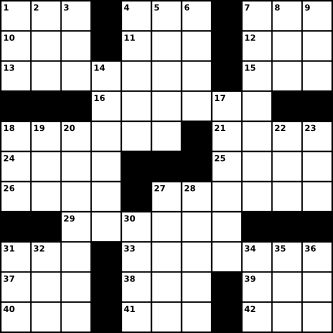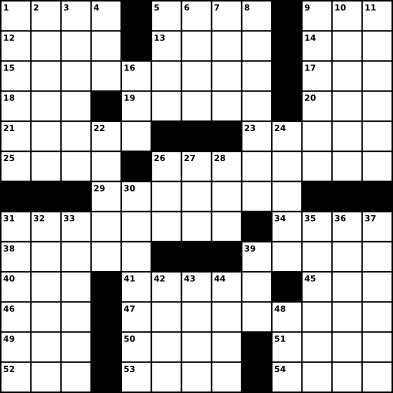The September 2009 Challenge
The Commuter Challenge awakes from hibernation with a simple task: Create a crossword puzzle. There are no requirements other than to conform to the standard requirements of (American) crossword puzzles. (Consult http://barelybad.com/xwdrulesreal.htm for an overview of the requirements.)
The Results
Ryan Finholm

|
|
|
Click here to download this crossword as an Across Lite file.
Brian Raiter

|
|
|
Click here to download this crossword as an Across Lite file.
(Warning: spoilers ahead.)
I’ve attempted to put together crossword puzzles a few times in the past, but this is the first time I’ve actually completed one. Once again the power of the deadline proves itself.
After a couple of false starts in trying to put some random words together, I started over, working from the opposite end: I selected a grid pattern first, and then started filling it in. Doing it this way was SO much easier. I’m a real proponent of using arbitrary constraints to spur creativity, and this challenge really demonstrated that, I felt.
Although there’s no explicit theme to my crossword, there is a hidden one, applying to all of the long across entries (and a couple of miscellaneous down clues, just for variety’s sake) — namely that they appear in a song called “The Anomaly Song”, by a little-known band named EDO. This doesn’t really work for an explicit crossword puzzle theme, because it’s so obscure almost nobody will know it (and it makes the crossword much too easy for the people who do know it). So basically it’s just there for Ryan to appreciate.
I started with the three long across entries in the center of the puzzle. Once I found three words from the EDO song that fit there, and made passable down entries, I started working outward. Having so much of the crossword already “set in stone”, more or less, definitely helped to clarify the decision-making process as I filled in the rest.
Another thing I learned was not to be afraid of filling in a section with terrible entries and then going back later to improve them. My initial instinct was always start with something reasonable in the fill, but sometimes it’s more important to just put something down and continue working. When you return to the terrible entry you’ll have a better idea of what kind of flexibility is available in the immediate vicinity, which helps you make intelligent choices on what to pursue. And of course, you may ultimately decide that the terrible entry at spot X maybe isn’t so terrible after all, when you compare it with the other terrible entries at spot Y and Z that you’d have to permit in order to improve X.
I had the good luck to have a friend who could playtest my crossword after I was done. I reworked several of my clues based on his input.
I think there are three terrible entries in my puzzle, namely ROR, AOT, and AGRE. They’re all too obscure (especially the last one) for most people to have any hope of getting, and so you’re completely dependent on the crossing clues to get them. Unfortunately AGRE crosses with VALSE, which turned out to be a much harder entry than I had intended. “Valse” is just the French word for “waltz”, and it basically means a waltz, but in English it usually implies an orchestral piece — i.e. a waltz that you listen to while sitting in a concert hall instead of moving around a dance floor. I thought that would be an easy clue, but it gave both Ryan and my playtester difficulty. I’ll know better next time.
I spent a lot of time looking up words, and non-words, online, as well as using my own wordlists. (I have to confess that I may have cheated a bit here. In the original challenge it was implied that it wasn’t permitted to use a computer program to help build your crossword. While I didn’t do that explicitly, I admit that having wordlists on your computer allows you to do certain kinds of lookups that are impractical with a physical dictionary, especially with a text editor like emacs.) I spent a lot of time reworking the bottom-center and the top-right sections until I had something that wasn’t ridiculous.
After I was finished with the fill, I wound up looking up almost every single word in various online dictionaries (thank you, onelook.com) to come up with decent clues. I generally avoided misleading clues, unless I felt confident that there were no hard clues in any of the crossing entries. I worried more about making it well-balanced than making it hard.
by Brian — 1 October 2009 @ 19:54
Gah. I’d like to take issue with the first sentence of the Challenge itself. This was by no means a simple task. This took me a huge amount of time. I was on vacation for most of a week in September, and spent much of it struggling to put this thing together. I only really made any progress when I re-started (one of many, many times I re-started from scratch) and, coincidentally, did the same thing Brian did, selecting the grid pattern first and then filling in words.
**Spoiler alert, sorta** I wanted to fit in as many words as I could that were specific to Brian’s novels (words from the titles, character names, etc) as I could in order to give the crossword puzzle some sort of theme, as is somewhat traditional for these things. I realize that it is even more traditional to use such words for all of the longest words of the puzzle, but I was unable to manage that despite several attempts. On the plus side, if you ignore BEK (not a great answer unless you’ve read Brian’s novel “Into the Sunset”), my only really awful answer in the puzzle was OET. And as for Brian’s list of his own terrible entries, I would remove ROR, which I think is perfectly fine, and replace it with ANYTH, which I thought was less than perfectly fine. What is that, the non-progressive tense of some kind of verb? When I ‘anyth’, I am ‘anyth’ing?
I figured Brian might be the only person to attempt to solve this puzzle, so I made the clues as convoluted and misleading as I thought I could get away with, to the point that they are bordering on unfair. I really wanted to pick some clues that were more likely to throw him off, a la the Stranger X-word (R.I.P.). Cases in point = “Where fob?”, “Between a rock and a hard place,” and “Em”. But it didn’t matter, Brian still solved mine in a half hour, while it took me considerably longer to solve Brian’s. Brian’s crossword was larger than mine, and therefore exponentially more difficult to construct and also harder to solve.
by RyanF — 4 January 2010 @ 09:07
Unfortunately for Ryan, I was already expecting his clues to be modelled on the X-Word, so I was fully prepared for that sort of thing when I sat down to work on it. No doubt Ryan’s entry would be much harder for anybody else.
For those not in the know, the X-Word was a Stranger-specific crossword created by Clark Humphrey in its early days, the first half of the 1990s. The clues in Ryan’s puzzle such as 14-Down, 40-Across, and 27-Across are the sorts of clues that one would not normally see in a standard US crossword, but were very reminescent of the X-Word.
To be fair, I should note that although Ryan’s puzzle only took me 30 minutes, it was not a leisurely 30 minutes. I worked nonstop (for 25 minutes anyway — I spent the last 5 minutes double-checking my answers and found a couple of mistakes). Considering that Ryan’s puzzle was only 11×11, that’s not bad.
As for awful answers … I completely agree that ANYTH in my puzzle is ridiculous, but it has the advantage of not being hard to figure out, so it’s not likely to also be annoying. The ones I called out are nearly impossible to figure out unless you happen to have a bit of esoteric knowledge.
Regarding Ryan’s list, I figured out 9-Down instantly, without even checking the size of the answer, so I don’t mind that. “Where fob?” is pretty ridiculous, but the question mark gives the solver fair warning, and I eventually did figure it out, upon which I laughed a lot. 19-Down (“Em”), on the other hand, I might have to give you, because I can’t remember now how that makes any sense with the answer. At the time I solved it I didn’t understand it until after I had filled in the answer via the cross clues, but now I can’t figure it out at all. What’s the logic there, Ryan?
by Brian — 4 January 2010 @ 14:48
“Em” is the sort of sub-basic notation for an E minor chord that you would find in rudimentary sheet music, and the E minor chord consists of the notes B, E, and G. It’s the sort of indirect clue that I really like, and that I believe would be more or less typical of an X-word from back in the day. Why not just make the clue something like “Plead”? Why not just use something like “___ borrow or steal”? Because “Em” is unfairly misleading and confusing, that’s why.
by RyanF — 5 January 2010 @ 09:42
Ah yes, I remember now. That was the one clue that I couldn’t make sense of on my own. I finally figured it out by looking up “em” on wikipedia and going down the list of definitions.
by Brian — 5 January 2010 @ 12:48